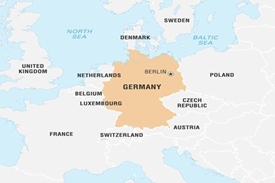International Relations
Context: Recently, German Chancellor Olaf Scholz came to India on a bilateral visit.
Key outcomes of the bilateral meeting
Green and Sustainable Development Partnership (GSDP):
- GSDP is an umbrella partnership that provides political guidance and steer to robust ties in climate action and SDGs.
- Under this, Germany will place €10 billion in new and additional commitments under their development cooperation portfolio in India.
- India-Germany agreed on a vision statement to Enhance Cooperation in Innovation and Technology.
- Under the framework of the Inter-Governmental Agreement on ‘Cooperation in Scientific Research and Technological Development’, the two countries share a long history of cooperation in science and technology, research and innovation.
Cooperation in Green Hydrogen:
- For this, the Indo-German Green Hydrogen Task Force was constituted in September 2022.
Triangular Development Cooperation:
- India and Germany agreed to work on development projects in third countries.
- Both sides concluded agreements on “Digital Transformation, FinTech, IT, Telecom and Supply chains’ diversification”.
Indo – German Bilateral Relations:


- Germany is one of India’s most important partners in Europe owing to the strength of bilateral relations, as also Germany’s key role in the EU.
- India was among the first countries to establish diplomatic ties with the Federal Republic of Germany after the Second World War.
- On March 7, 2021, India and Germany marked the 70th anniversary of the establishment of diplomatic relations.
Trade and economic relations:
- Germany is India’s largest trading partner in Europe, with a total trade of USD 21.07 Billion in 2020-21, occupying 17.4% of share in European Market.
- Germany is the 7th largest foreign direct investor in India since April 2000.
- Germany’s total FDI in India from 2000 until 2019 amounted to US$ 11.9 billion.
- Germany has a Bilateral Trade and Investment Agreement (BTIA) with India via the EU.
Multilateral Cooperation:
- Germany and India support each other on UNSC expansion within the framework of the G-4.
- Germany joined the Coalition for Disaster Resilient Infrastructure (CDRI) in February 2020 and participated in the first Governing Council meeting in March 2020.
- In April 2021, the German Federal Cabinet approved the signing of the amended framework agreement of the International Solar Alliance (ISA), and thereby Germany’s accession to the ISA.
Defence co-operation:
- India-Germany Defence Cooperation Agreement (2006) provides a framework for bilateral defence cooperation.
- Both the countries signed the Arrangement on Implementation of the Agreement, concerning Bilateral Defence Cooperation which enables both the countries to share classified information with each other
- Indian and German navy ships regularly conduct anti-piracy operations in the Indian ocean.
- The first ever Franco-Indian-German military exercise is expected to take place in 2024.
Science and Technology:
- Bilateral Science and Technology cooperation is implemented under an Inter-Governmental Agreement on ‘Cooperation in Scientific Research and Technological Development’ signed in May 1974.
- The Department of Science and Technology (DST) and the German Federal Ministry for Education and Research (BMBF) are the nodal agencies for overall coordination.
- An apex Indo-German Committee on Science and Technology, established in 1994 coordinates the implementation of cooperation and joint review of activities.
Culture and Indian diaspora:
- The translation of Kalidas’s ‘Shakuntala’ in 1791 envisaged institution-based scientific research on sacred Indian texts for the quest of Indian philosophy and literature.
- Max Mueller was the first scholar of Indo-European languages to translate and publish Upanishads and Rigveda.
- There are around 03 lakh (December 2021) Indian passport holders and Indian-origin people (about 1.60 lakh NRIs/Indian Passport holders and around 43,000 PIOs) in Germany.
Issues associated with bilateral relations:
- Germany’s low trade: Germany’s trade with India is less than ten percent of its trade with china.
- Restrictive Policies: Germany has an advanced defence manufacturing comparable to that of France, but the defence exports are less than potential because of restrictive arms export policy
- Lack of a separate bilateral investment treaty between the two countries hampers the commercial potential between two countries.
- Germany is not confident about India’s trade liberalization measures; it bats for more liberal labour regulations.
Way Forward:
At present, in spite of various setbacks, the Indo-German relations have made a rapid stride. The ‘policy of benign neglect’ had changed into a more ‘vibrant partnership’. Indo-German cooperation should be based on a win win situation so that both countries can help each other in improving their economic, technological, defence and political position in the international arena.
This is not a difficult task as Germany are India are “natural allies”. While Germany has surplus capital, modern technology and a demographic deficit, India has a deficit of capital, lacks modern technology and has exportable human capital.
Source: The Hindu











